"In your university life, don't worry about the results, and put in the effort."
Former Japan Women's National Rugby Team/Head Coach of Waseda University Women's Rugby Football Club
Chisato Yokoo

At Waseda University Kamiigusa Grounds
Spring is the season to take a step towards new challenges. One year ago in the spring, the Waseda University Women's Rugby Football Club took a truly historic step. Waseda University, which has been a leader in the Japanese rugby world, attracted attention as a "new option for women's rugby." The first head coach of the team is Yokoo Chisato, a graduate of School of Social Sciences. She too has been taking "new steps" that no one else has taken since her student days.
Rugby-themed university life. Campus is a time for relaxation.
Influenced by her grandfather, who was a rugby player, Yokoo became passionate about rugby from the first year of elementary school. Since there were not many girls playing the sport, it was natural for her to play with boys.
"I played with boys in junior high school, and naturally had an admiration for Waseda rugby. But when I was told for the first time that I wouldn't be allowed to play contact games with boys in club activities at high school, I realized, 'That's not rugby anymore. I can't follow the same path as everyone else.'"
Still, giving up rugby was not an option for Yokoo. During high school, she spent her days immersed in rugby, participating in practice sessions for her alma mater's junior high school rugby club on weekdays and honing her skills with a women's club team on weekends.
"I never once thought about quitting rugby. There were many male players from my high school who continued playing rugby at Waseda University. I couldn't play rugby in a university club, but I wanted to follow the same path, so I took the entrance exam for Waseda University."

Thus, Yokoo enrolled at Waseda University in 2011. The women's rugby world had just been informed that seven-a-side rugby would be included in the Rio 2016 Olympics. As a candidate for the Japanese women's national team, Yokoo's student life was dominated by rugby in order to achieve her goal of winning an Olympic gold medal.
"I spent 265 days a year at training camp, and in between those days I would commute to university wearing a tracksuit and carrying a ball. After class I would head straight to the field, and after practice I would go to the training camp. I had no private life, and my university life was all about studying and rugby."
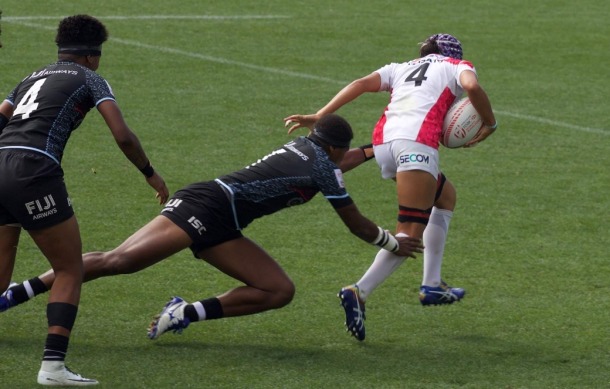
This photo was taken at the World Rugby HSBC Sevens Series 2013. The team traveled around the world for matches and training camps. Yokoo is on the far right.
However, at the time, the Japanese women's rugby team was mainly playing 15-a-side rugby, and the know-how for the seven-a-side rugby team was still in its infancy. Yokoo and the national team were completely lost as to what they needed to do to win the gold medal in the seven-a-side rugby team, and they spent their days completely absorbed in the process.
"At the time, the coaches were still feeling their way around, so I think they were trying to reassure themselves that doing difficult things would make things okay. They made us run around without a ball, received training from the Self-Defense Forces, and did really tough things. Looking back, a lot of it was really inefficient."
It was precisely because of these harsh conditions that Yokoo's days on campus became a time of relaxation.
"At university, I was in a seminar on 'Intercultural Communication' and enjoyed interacting with people who had nothing to do with rugby. I had always lived with the mindset that I was in the minority as a women's rugby player, but I realised that it was actually quite normal. There were so many people who were even more unusual than that, which was stimulating. When I thought about my future, I realised that I wanted to broaden my horizons beyond rugby, which was a great benefit of my university life."
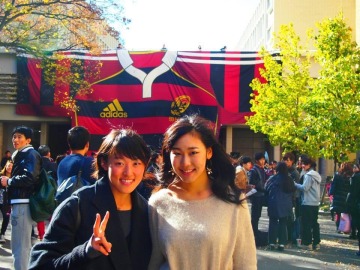
There was no Entrance Ceremony due to the Great East Japan Earthquake in March 2011. "Even so, I was supported every day by the friends I made," Yokoo (pictured left) recalls.
"Time for someone else" will surely be beneficial for you someday
The Rio de Janeiro Olympics came around in 2016, a year after graduating. The Japanese team finished in 10th place out of 12 teams with one win and four losses, falling far short of their goal of winning the gold medal. The feeling of despair caused Yokoo to be unable to play rugby or work for about a year after the Olympics, and Yokoo suffered such mental damage that Yokoo shut himself in at home.
"Everyone naturally thought, 'If we're going to aim, we have to aim for the gold medal,' and we didn't have any other options. So, more than just feeling disappointed about our 10th place result, we just couldn't accept it...The shock was so great that I couldn't even talk about the Rio Olympics with my fellow competitors for four or five years afterwards."
Again, what was the cause of the failure?
"I can say with confidence that all the players put in effort. They had really tough, difficult days. But we were working hard in the wrong way. Effort itself is important, but we keenly felt that unless it's the right kind of effort, it won't lead to results. It was a big setback both for the players individually and for women's rugby."
From there, Yokoo was inspired to aim for the next Olympic Games in Tokyo 2020. What made Yokoo decide to face rugby once again?
"It was because there were staff members who believed in me and waited for me to join. Playing for the Japanese national team isn't something you can do just because you want to. Even if I was asked to play, there's a chance I would not be selected in the first place. I thought, 'Rather than deciding on my own, if that's what's wanted, then I'll do my best.'"
After graduating, Yokoo began working for All Nippon Airways (ANA) while continuing his career as a rugby player.
Left: In 2019, when he returned to the court after a serious injury, Yokoo's colleagues came to support Yokoo with a banner they made.
Photo on the right: At ANA's Flight Operations Center, flight crew members work together to plan activities.
As a result, due to repeated injuries, Yokoo decided to retire just before the Tokyo 2020 Olympics. From then on, Yokoo began to work hard, but Yokoo's attitude of "I'll do my best if I'm asked" led Yokoo to an unexpected future, becoming head coach of the newly established women's team at Yokoo's alma mater.
"At first I declined. I had no experience coaching rugby, and there were other people who had been working hard to establish a women's rugby club. But after being approached many times, I started to think about it. More than just teaching rugby techniques, I felt that there was something I could contribute, as I have experience in creating an environment in which women can play from scratch."
Thus, the Waseda University Women's Rugby Football Club was born in April 2024. How do we look back on the activities of the past year?
"Right now, half of the members of the team have no prior experience, but I can see their growth every day. Whatever I say sticks in their heads. I'm reminded every day of the importance of choosing the right words, how I communicate, and sticking to my own teaching philosophy."
Coaching the women's rugby team. "Thanks to these girls, I feel like I made the right decision," says Yokoo.
Yokoo-san interacts with students every day and watches over their growth. Reflecting on Yokoo's experience as a coach and Yokoo's own time as a student, Yokoo says there is something Yokoo wants students to cherish during their time at Waseda.
"Whether you call them friends or colleagues, however you choose to express it, I want you to treasure the time you spend with them. Being able to spend time on others is a privilege that only students with plenty of free time can offer. That 'time for others' will surely benefit you someday. With that in mind, I want you to use your time meaningfully."
We also received some advice that was typical of Yokoo, who learned the importance of "right effort" from his disastrous defeat at the Rio de Janeiro Olympics.
"You probably won't know at first what the right amount of effort is. That's why I want you to try lots of unnecessary efforts while you're in college, without worrying about the results. Learning from experience is your greatest asset. I want you to make lots of mistakes and come to the conclusion that 'the right amount of effort will be rewarded.'"
Interview and text:Naoto Oguma (Graduated from School of Letters, Arts and Sciences II in 2002)
Photography: Kota Nunokawa
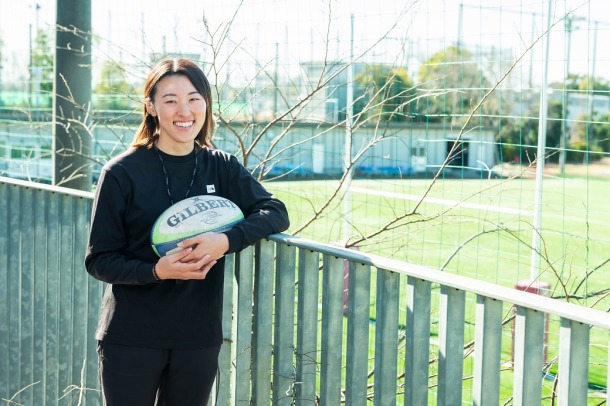
【Profile】
Born in Tokyo in 1992. Graduated from School of Social Sciences at Waseda University in 2015. Joined All Nippon Airways (ANA) in the same year. Played as a member of the Japan Women's National Rugby Team while still a student, and participated in the 2016 Rio de Janeiro Olympics as a member of the Japan Women's National Rugby Sevens Team. Retired from active competition in 2021. Currently working full-time for ANA, Yokoo is the head coach of the Waseda University Women's Rugby Football Club, where Yokoo is dedicated to player development and team management.

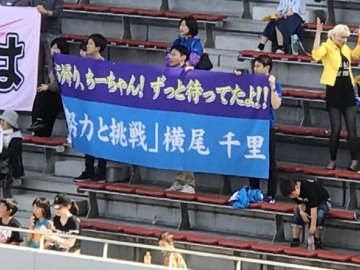
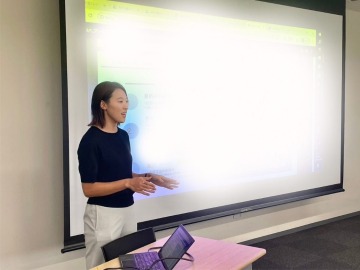
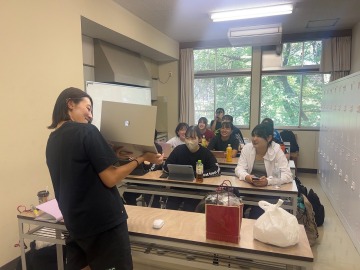
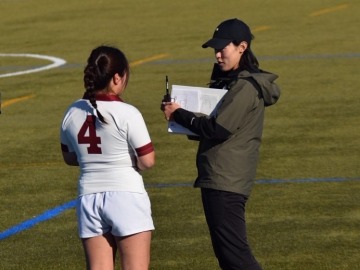
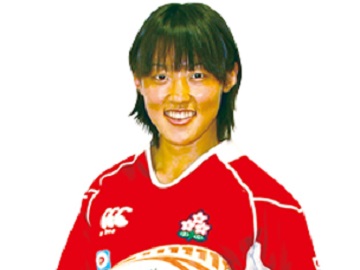
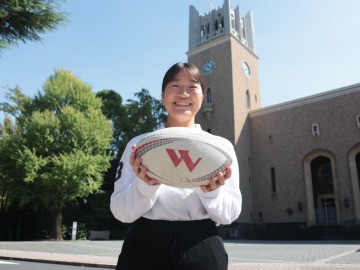
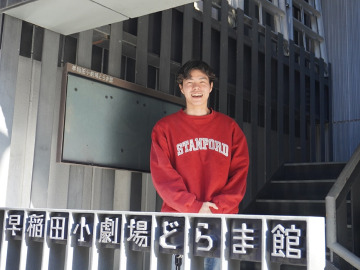
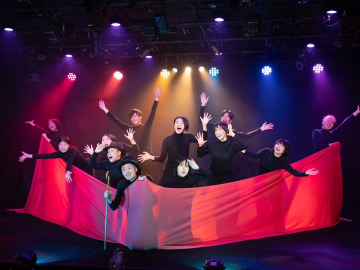

![[Save version] Map of the four main campuses](https://www.waseda.jp/inst/weekly/assets/uploads/2025/09/17cb2975123fc5103172ef60bd98608d-610x458.jpg)

